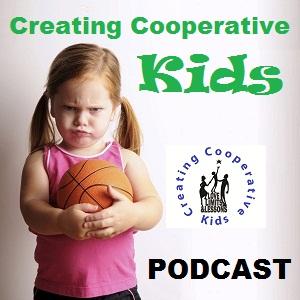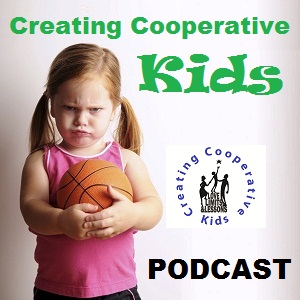Episodes

2 days ago
2 days ago
Get ready to learn the number one solution to stopping back talk and at the same time, increasing cooperation. You'll be listening to an excerpt from my television show, Creating Cooperative Kids, that was taped in front of a live studio audience. Sit back and relax, and get ready to learn tips that could change the dynamics of your home or classroom.
I surveyed parents over a 3 year period who attended my parenting workshops. The survey asked them what was their biggest complaints about the kids that brought them out to hear me speak. Now, the top 3 complaints I received were: they don't listen, they don't cooperate, and they talk back. When I brought these results up at other parent groups, the parents there agreed. Parents are hungry for the solution to these common and frustrating problems, but sometimes I'm able to change their perception completely when I tell them that a very high percentage of these problems are actually a symptom of something else and something the they can control.
If you too are experiencing these same problems with your children, pay close attention as I reveal much of the cause of children not listening, a lack of cooperation and back talk. The most important thing that I want offer you might be difficult to embrace. The greatest cause of a lack of cooperation from the kids is something we parents can control... our kids don't feel fully connected to whoever the primary caregiver is. Connection is the key. I believe that we were all put on this earth to feel connected to others. We're supposed to feel connected in families, groups, teams and clubs. We are a species created to be with each other. And children, whether they're 3 or 13, have this same desire; to feel connected. I think all children really want their parents to listen to them and to truly see them.
Children want their parents to really be there 100%. The worst thing we can do is to be talking to a child when we're on phones or using other distractions. The primary thing that I hope to help you all understand about reconnecting with children, is how to do this when children have been away from the primary caregiver for an extended period of time, perhaps overnight or all day at school. When kids wake up in the morning, they want to check in with mom or dad or whoever their primary caregiver is. It's almost as if they have a plug and they just wanna plug back into whoever is caring for them. It can even be a grandparent or a stepparent, whoever it is, they just crave to plug back in. They just wanna know that they are important, that they exist that you can hear them. That they still matter.
A mom came to me one time and said, you know, I'm having this problem with my kids. Every morning they begin to fight at the breakfast table. They're 4 and 6, and I can't stand it. I'm ready to sell my kids to the zoo. Please tell me What I can do to stop this fighting when it happens. This is a perfect example of the symptom of a child not feeling plugged in and connected and as a result, misbehavior can occur. Back to this mom's need for help, I asked her, when this fighting breaks out, what is going on with her? She then went on to list all of the chaos she was generating in that moment. She said, "I'm a single mom and I'm loading the dishwasher, putting in a load of laundry, I'm making lunches, I'm folding clothes and I might even be trying to talk to my boss on the phone, all at the same time."
In that moment listening to her, I could feel the stress coming from her while she explained everything. So I said to her, here's one solution that, if you put 100% of your effort into it, it could resolve this issue and reduce the one thing you want to stop... the fighting. So here is your assignment. Starting on Monday morning because it begins a new week, I want you to sit down at the breakfast table with your boys. Come to the table with some sort of timer and set it for 10 minutes, just 10 minutes. During that 10 minutes, I want you are to sit there quietly and calmly and don't speak. I mean, don't say one word. Your only job is to communicate through your facial expressions. That means a lot of smiling and nodding. Just 10 minutes.
One additional step... because you've got a younger child, a 4 year old, you be more successful if you take the time to set this all up in advance with the boys. This way they'll know what to expect and won't get freaked out on Monday morning that mom has lost her ability to speak. Over the weekend, set up what the new breakfast morning scenario will look like and practice it with them. Mom then says to me... "You're kidding me, right?! That's your advice?! To sit for 10 minutes with my kids and not talk?! I said yes. She said that's the most ridiculous parenting advice I have ever heard."
One of the things I wrote about in my book Love Limits and Lessons is that the the it's so important for us to plug in and connect with our kids and especially with young children. And it's good advice to help them see in advance what it's all going to look like. So the mom got mad at me. She actually got up and left and walked out of the workshop. She wanted nothing to do with it. She thought it was the most ridiculous thing. Until about 2 or 3 days later she was done being mad at me and she tried it. Two weeks later she left me a voicemail and apologized for her behavior because she suddenly saw instant results.
Now, do you think the fighting and arguing went away? No, probably not, but it got to a more tolerable level of arguing and bickering that reduced mom's stress about the fighting. Believe it or not, connecting with kids is one of the easiest things we we can do and the most powerful, if we believe in it and get behind it. Another stressful segment of any parent's day is the end of the day when you're picking kids up from school or they're coming home from school. When you come back together as a family as a unit, they again need that same kind of thing... the plug back in to the parents. I urge parents to talk less and listen more during these two critical points of a day with kids.
If you have to speak during these times, avoid giving commands and instead, ask questions. They don't care what you're gonna say in those first few minutes they just wanna know that you care. They wanna know that you're you're still there for them and they're still number one. Also avoid getting distracted with newspapers, phones or televisions. You'll be more successful as a parent if you help them feel connected: no distractions, less talking, questions if you have to, facial expressions if you have to communicate and do it all at their eye level. Getting to their level says, "You are very important to me and I see and hear you right now in the moment."
This isn't much different than what we experience as an adult. How many times have you felt this yourself with someone you're in a relationship with, or perhaps noticed another couple experiencing this? Maybe you found yourself wanting to just say to the other person, "Do I matter? Just slow down for a minute. Can you shut the TV off for a little bit? Put that newspaper down, or want to say to them, "I want you to hear what I have to say right now." This connection is more important than ever in humans, especially children. What we have to realize is that if we allow our child to plug back in and reconnect with us, it can actually eliminate the need to act out and misbehave. That's because so much of challenging behaviors in children is communication. They are trying to tell us that they crave reconnection to us.
So if you want cooperative kids, look for opportunities to help them feel like they're important and they matter. In the sample solution I gave to that mother seeking help, suggesting 10 minutes of silence for her at the table, you could even get away with just five minutes, especially just starting out with this type of exercise. Lead this kind of exercise you'll begin to notice changes in their behavior.
I want add one other important thing that can increase a child's cooperation; encouragement. Encouragement is showing support for things they can do and accomplish. It's not just giving attaboys, but instead, getting them to talk about the things they like and can accomplish. It's all about looking for opportunities to make positive comments that help them feel important in the family or the classroom. It's been said that children need encouragement like flowers need water. Studies have been done to show how adults and youth alike are discouraged far more often then encouraged. Examples of discouragement include words intended to make them feel small, unimportant or insignificant. Encourage on the other hand are positive comments that lift them up.
I like to remind parents to learn to calm themselves and slow down a little bit more. If we take time to breathe deeply, amazing things happen and I know it sounds weird, but when we breathe deeply, more oxygen goes to our brain and allows us to think more clearly and be able to react more effectively in stressful situations. And when we slow down and become more calm, more often, we'll begin to notice a change in our children as well. They will feel that calmness from us and begin to feel heard and seen by us all the more. This will reduce their need to misbehave, talk back and they will in turn, listen more.


No comments yet. Be the first to say something!